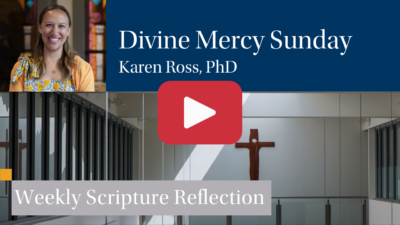
Readings:
Reading I: Acts 2:42-47
Psalm 118:2-4, 13-15, 22-24
Reading II: 1 Pt 1:3-9
Gospel: Jn 20:19-31
“Each of us is more than the worst thing we’ve ever done,” wrote lawyer and founder of the Equal Justice Initiative Bryan Stevenson in his bestselling book, Just Mercy: A Story of Justice and Redemption. This powerful statement carries even more weight when it is contextualized by the work that EJI does to advocate for incarcerated people, people on death row, and children who are tried as adults in the United States criminal justice system. Far from being a system that enforces justice, many social scientific studies have shown that convictions and sentences in the United States are often influenced by wealth, not culpability, and that the nation’s long history of racial discrimination and prejudice continues to disproportionately affect the sentencing of black and brown people.
Stevenson and his collaborators at EJI base their work on the conviction that all people- even and most especially those who have committed egregious crimes- are still worth more than their wrongful actions, and ought to be treated with dignity and respect. This belief resonates with the foundational principle of Catholic Social Teaching: the principle of human dignity and human rights. Since God created all humans in God’s image and likeness, we all have an inherent dignity that cannot be taken away.
As Christians, it is our duty to honor the divinely-endowed human dignity in others, even when it is the most difficult to do. This Sunday is Divine Mercy Sunday, and we are reminded by the Psalmist that God’s mercy endures forever-this news is cause for rejoicing! Through the death and resurrection of Jesus, which we celebrated last weekend in the Triduum, “God’s great mercy gave us a new birth to a living hope” (1 Peter 1:3). This great mercy is available to all of humanity, even those who are rejected by society due to the harms they have caused. The Psalmist proclaims that “The stone which the builders rejected has become the cornerstone.” Who in our society today represents the stones that are rejected in the building of our communities? How can we as Christians emulate God’s great mercy that was shown to the world through the cross?
The late Black Liberation Theologian James H. Cone made the powerful connection between the cross of Christ and the lynching tree on which Black people were crucified in the US up until the 20th century. While both the cross and the lynching tree are the torture and death instruments of their time, the cross of Christ represents the power of God to overcome death and bring new life to all people. Thus, the cross is a stark reminder that God suffers alongside those who suffer, and that preaching the good news of the Gospel necessitates standing with the marginalized and persecuted. We cannot look away from the lynching tree. In today’s Gospel, Jesus invites us to look upon the marks of the nails on his hands and sides and remember that his marked body is a symbol of life and love overcoming the terror of death. As we rejoice in the mercy of God that shows compassion and forgiveness in the face of the worst things we have done, may we, too, work to be builders of justice and mercy in our own communities.
Director of Pathways@CTU
This year, CTU is awarding Bryan Stevenson, Founder of the Equal Justice Initiative and subject of Dr. Ross’ reflection this week, our highest honor: the Peacemaker Award. To join us for this special event, CLICK HERE.
To learn more about EJI, CLICK HERE.
